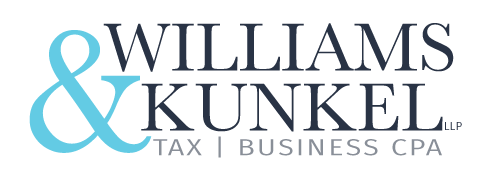Taxes are hard and stressful enough to do without making avoidable errors. Before clients file, they should double check to make sure they don’t make the following tax errors. We often hand out this checklist to clients to avoid mistakes in advance.
- Not signing the return (if you file paper copies)
- Number transposition and spelling errors
- Unchecked or unanswered questions
- Entering incorrect or unpaid estimated tax payments
- Missing pages in a paper filed return
- Not correcting reason for a tax notice for a prior year, on this year’s return, if there is a continuing issue
- Underpaying or overpaying [Ugh!!!] the tax due
- Sending your tax check or making out the check to the wrong tax agency
- Not calculating underpayment penalty (on Form 2210), if applicable
- Not calculating a penalty on an early withdrawal from a retirement or IRA account
- Calculating a penalty on a permissible early withdrawal from a retirement account
- Paying tax and penalty on IRA distributions that were rolled over to another IRA account
- Failure to calculate a penalty if you took more than one 60-day tax-free rollover in a 365-day period
- Not filing Form 5329 (Additional Taxes on Qualified Plans Including IRAs and Other Tax-Favored Accounts) when it was required and if being filed separately from tax return, it must be signed
- Not calculating self-employment tax on freelance income or commissions
- Responding to an email notice from a tax agency – they do not send emails. You received spam.
- Your paid preparer did not sign your return or enter their ID number.
- Claiming the wrong exemptions or omitting a correct Social Security number
- Claiming an exemption for someone who properly can claim themselves (this can occur when a dependent marries during the year and files a joint return; or no longer qualifies as a dependent such as because of excessive income and/or is not a student for at least five months of the year or is a student and over age 24 at end of the year; or a child you support where your ex-spouse is entitled to the exemption under a divorce agreement)
- Omitting a Social Security number for someone you paid alimony to
- Not itemizing deductions when you should have
- Claiming excessive home mortgage interest deductions is a red flag. Interest on home mortgages over $1,100,000 is not deductible.
- Deducting points in full on refinanced mortgages, instead of amortizing them
- Reporting mortgage interest and real estate taxes on rental properties as itemized deductions
- Not claiming investment interest costs properly and not being aware of limitations or interest tracing rules
- Omitting or reporting incorrect state tax payments and withholdings as an itemized deduction
- Reporting deductions that stretch the imagination, e.g. someone with high debt indicated by a high mortgage and extensive home equity loan interest (not reportable) usually won’t be making cash charitable contributions equal to 16 percent of their gross income
- Not properly picking up carry forward expenses or credits from the prior year’s return, which includes charitable contributions, investment interest expense, net operating loss deductions, capital losses, suspended losses from passive activities, alternative minimum tax credits and foreign tax paid credit.
- Reporting as income the state tax refund you received and that was reported on a 1099 when you did not get a full deduction for that on your prior year’s return because you claimed the standard deduction or all or part of the payments were “disallowed” because you were subject to the alternative minimum tax
- Not correctly answering foreign account questions on bottom of Schedule B especially when
- Schedule B is not otherwise required to be filed and then not filing the FBAR Fin CEN Form 114
- Overstating charitable contributions or deducting contributions you did not make, or overvaluing non cash contributions
- Not having proper charitable contribution receipts in your possession when you file your return claiming those deductions
- If you made non-cash contributions over $500 additional forms must be attached to your return
- Not having a certified appraisal if you made a gift of tangible property over $5,000. The entire contribution can be disallowed because of this.
- If your income is sufficiently high, not adding the 3.8 percent tax on net investment income or the .9 percent tax on earned income
- If you were a “real estate professional” who did not claim yourself as such you possibly subjected yourself to the tax on net investment income
- Reporting incorrect cost basis on sales of capital assets, which is common with inherited stocks, stocks received as a gift, or with dividend reinvestment account accumulations or where you had a previous wash sale.
- Not treating wash sales properly. If you have a wash sale, any losses are not deductible but increase the basis of the purchased shares that caused the wash sale.
- Reporting gross sales from brokerage transactions that are less than the amounts reported on the 1099s issued by your brokers
- Not reporting proper basis on employer stock sales that were also reported as income on your W-2 form
- Self-correcting and reporting the “correct” amount where you received an incorrect 1099 (and cannot get a corrected 1099 in time to file your return). You should report on your return the amount on the 1099, even if it is wrong, and subtract as an adjustment on another line (e.g. line 21) so the net amount is the proper income you received
- Omitting allowable IRA, Roth IRA, SEP or other retirement plan contributions
- Omitting paying payroll taxes on your individual tax return for household employee
- Inputting incorrect bank account numbers and information for your tax payment or refund
And last but not least: don’t forget to e-file or mail your return by the April 18, 2017 due date!
Looking for tax advice this year? Call Williams & Kunkel CPA today in Flower Mound at 972-446-1040 to have a chat.
In addition, you can connect with us to receive updates throughout the business week by following us on Twitter or LinkedIn or liking us on Facebook.

